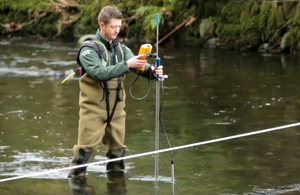National Drought Group – Chairman’s Statement: 19 November
The Environment Agency host the National Drought Group (NDG) which brings together stakeholders to coordinate action to maintain protect the environment.

water monitoring
The National Drought Group (NDG), chaired by Environment Agency Chief Executive Sir James Bevan, brings together government departments, water companies, environmental groups and others to coordinate action to maintain water supplies, consider water users and protect the environment.
The National Drought Group met on Monday 19 November to assess the water resource situation and actions being taken to reduce risk in 2019 after the exceptionally hot and dry summer.
Current situation and prospects
There has been below average rainfall in England for the past six consecutive months (May to October). So although river flows have increased following recent rain, some groundwater and reservoir levels are in decline.
Across Yorkshire, central, southern and eastern England, water resources are at lower levels than normal after a very hot summer and months of low rainfall. A significant number of public and on-farm storage reservoirs are at low levels for the time of year.
Yorkshire Water has requested a drought permit relating to flow from a reservoir to the River Wharfe. Other water companies should be considering whether they need to apply for drought permits to replenish some very low reservoirs over the winter months to bolster supplies for next year.
As we move into the winter the Environment Agency, the water companies and the other members of the NDG reaffirmed that they will continue to work closely together to reduce the risk of water restrictions and balance the needs of the public, businesses and the environment.
At the meeting Defra and EA water experts asked water companies to confirm that they were doing everything possible to act early to plan for possible pressure on supplies next year.
Water companies confirmed that they have taken and will continue to take a range of actions rigorous to maintain water supplies for customers, including:
- Focusing on leakage management, optimising sources and reducing levels of outage, to help sources return to a healthier position should there be hot dry weather next year
- Running a winter preparedness campaign to ensure customers have information on how to protect pipes during the cold weather, helping to reduce leaks and keep demand low
- Following drought plans to take timely actions and not delaying implementing winter refill drought permits to help replenish supplies for next summer.
Action the Environment Agency is taking includes:
- Closely monitoring the environment to assess the environmental conditions of water courses that are affected by sustained low flows.
- Working with environmental NGOs and site managers to optimise management of wetland sites
- Working proactively with farmers and other abstractors to manage impacts and ensure they have the water they need and the environment is protected
- Reviewing guidance for water company drought plans and incorporating lessons learnt over this summer
- Working together with Defra, water companies, the National Farmers Union, Canal & Rivers Trust, environmental NGOs and other stakeholders to agree a common picture and coordinated communications
Conclusions and next steps
The NDG confirmed that while there is no immediate threat to essential water supplies a drier than average winter would bring the risk of restrictions to some water company customers. It would also prove another challenging summer for farmers next year and cause further environmental impacts across the country. NDG members agreed to continue to work together to manage down these risks: in the short to medium term with actions to replenish water shortage supplies; and in the longer-term by working work collaboratively to enhance the country’s resilience to drought and water shortages.
The NDG will meet again in early 2019 to take stock and agree any further necessary measures.